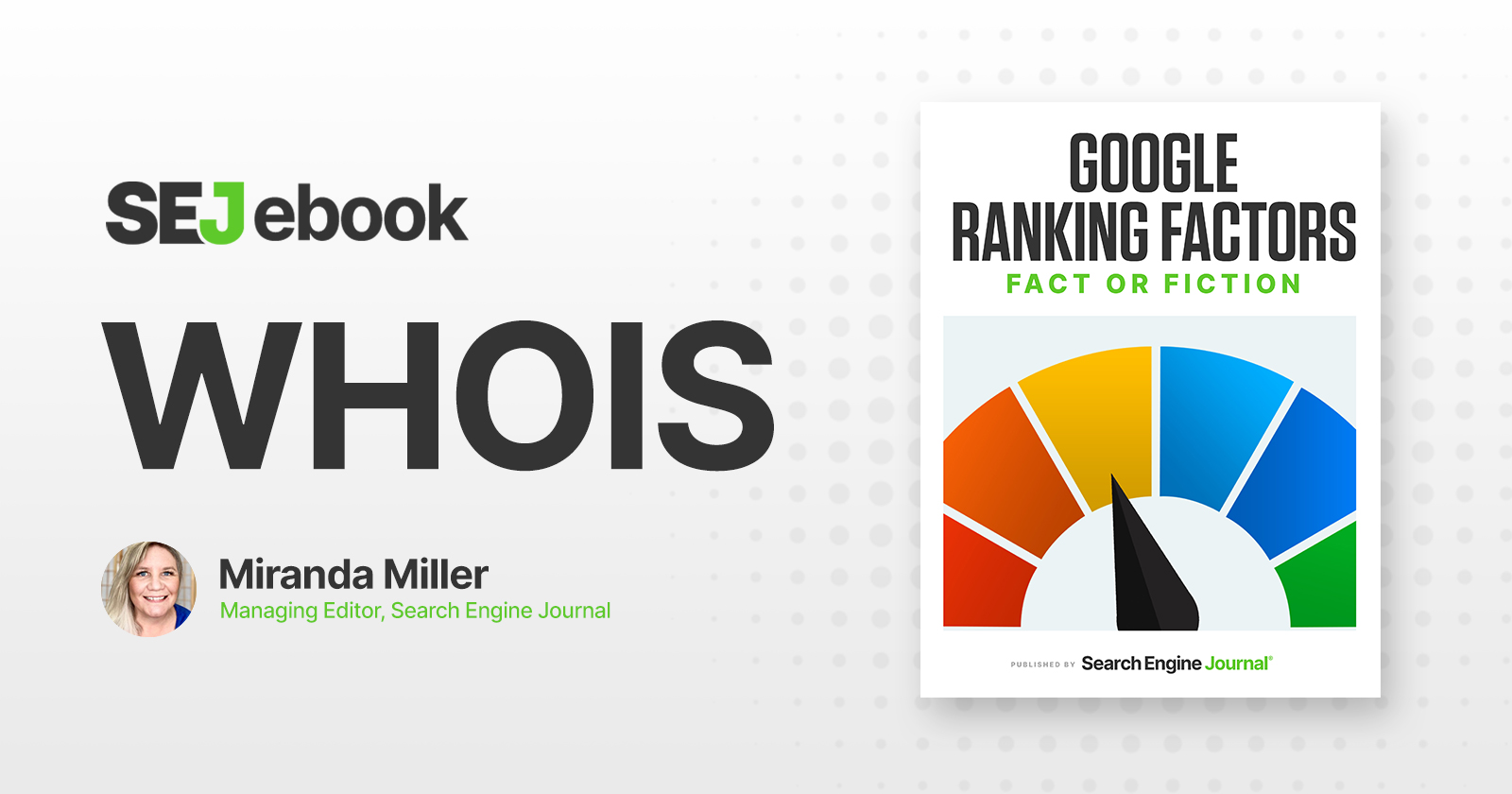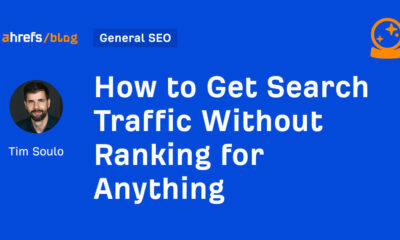SEO
Is It A Google Ranking Factor?

When you register a domain, the registrar has your identifying information.
However, you can choose domain privacy protection if you don’t want the names, addresses, phone numbers, etc. of website contacts listed in WhoIs for all the world to see.
There are plenty of legitimate reasons people want to protect their privacy online.
But does WhoIs information – or using domain privacy – have any SEO implications?
The Claim: WhoIs Information Is A Ranking Factor
Some of the questions that have come up around the potential impact of domain privacy on SEO include:
- Does hiding your WHOIS information hurt your website’s ranking?
- If we have a large number of sites in our network but are using domain privacy, will Google count the links passing back and forth as legitimate?
- Is WhoIs a Google trust factor?
The Evidence For WhoIs Information As A Ranking Factor
When Google became a domain registrar in January 2005, SEO professionals were immediately suspicious about how registration information might be used in the ranking algorithm.
Barry Schwartz noted the following month that a Google spokesperson had fanned the flames with this comment to the New York Times:
“While we have no plans to register domains at this time, we believe this information can help us increase the quality of our search results.”
There was no real industry consensus on this for a few years, as SEO pros and webmasters shared conflicting experiences and advice in forums.
In 2007, an industry blogger cited Matt Cutts as the basis for this recommendation:
“Don’t hide behind domain privacy services if you don’t have a legitimate need to.
There is evidence that search engines can see right through this ‘wall’ anyway and it makes your site less trustworthy to normal (albeit tech savvy) visitors/customers.
Make sure the whois data matches the contact details on your site and in your privacy policy, too.”
As Loren Baker said at the time:
“By not wanting to be spammed in your inbox, mailbox, phone box or possibly even via your XBox, are you telling search engines that your site cannot be trusted? I’m not sure this is the case.”
The above blogger made that recommendation based on what Matt Cutts wrote of the site reviews he’d done at Pubcon in 2006:
“Rather than any real content, most of the pages were pay-per-click (PPC) parked pages, and when I checked the whois on them, they all had “whois privacy protection service” on them.
That’s relatively unusual.
Having lots of sites isn’t automatically bad, and having PPC sites isn’t automatically bad, and having whois privacy turned on isn’t automatically bad, but once you get several of these factors all together, you’re often talking about a very different type of webmaster than the fellow who just has a single site or so.”
Even then, there was no evidence that “hiding” behind domain privacy protection and opting to keep your home address out of the WhoIs database had any impact on ranking.
As Cutts said, it could be perceived by the webspam team as a red flag. But he was talking about it popping up in conjunction with other factors.
That was all a long time ago, so let’s get more current.
In 2016, an SEO pro published a case study on a fairly reputable site claiming that WhoIs was a trust factor, and he could prove it.
Specifically, he said, the address you use in your WhoIs contact info must be in the same general region that your site serves.
Turning on domain privacy protection or using a mailing/physical address outside of the area your site intends to serve would kill your rankings. Or so the story goes.
We have to look at the wider context of the state of Google at this point.
Google was into (or had gone through) many iterations of identity detection and verification methods by then — Google+, Authorship, IPv6, etc.
This Whiteboard Friday episode with Cyrus Shepard from May 2014 gives us a look back at the various signals and clues Google was using even then to determine who controlled which sites.
The algorithms had become far more sophisticated than when we were having these conversations in 2005.
Given that the SEO pro simply presented a story with no backing evidence, it’s difficult to buy into that anecdotal experience that Google considered WhoIs/domain privacy a trust factor in its ranking algorithms in 2016.
The Evidence Against Whois Information As A Ranking Factor
So let’s get more current.
In 2019, John Mueller responded to a tweeted question as to whether domain privacy settings affect SEO. He was clear:
No, feel free to use the privacy settings as you want them.
— 🍌 John 🍌 (@JohnMu) April 3, 2019
And today, Google has only a 2% market share in domain registration.
They don’t have access to enough data for this to have any reliability as a search signal.
In 2021, Mueller was again asked (this time on Reddit) whether domain privacy settings impact SEO or rankings.
His response: “No.”
WhoIs Information As A Ranking Factor: Our Verdict
There’s no evidence that Google ever used domain privacy protection as a ranking factor.
Perhaps they planned to back in 2005 when they first became a domain registrar.
Maybe they even did, for a short while.
But not for long, if so – and they definitely aren’t using it today.
With that said, if you’re attempting to mask the identity of site owners to create link networks or otherwise manipulate search rankings, you’re solidly into webspam territory.
That puts you at risk of a manual penalty if detected.
Google recognizes that online privacy is important and there are perfectly valid reasons people choose to keep their personal information out of WhoIs.
WhoIs is not a ranking factor.
Featured Image: Robin Biong/Search Engine Journal
SEO
Google Cautions On Blocking GoogleOther Bot

Google’s Gary Illyes answered a question about the non-search features that the GoogleOther crawler supports, then added a caution about the consequences of blocking GoogleOther.
What Is GoogleOther?
GoogleOther is a generic crawler created by Google for the various purposes that fall outside of those of bots that specialize for Search, Ads, Video, Images, News, Desktop and Mobile. It can be used by internal teams at Google for research and development in relation to various products.
The official description of GoogleOther is:
“GoogleOther is the generic crawler that may be used by various product teams for fetching publicly accessible content from sites. For example, it may be used for one-off crawls for internal research and development.”
Something that may be surprising is that there are actually three kinds of GoogleOther crawlers.
Three Kinds Of GoogleOther Crawlers
- GoogleOther
Generic crawler for public URLs - GoogleOther-Image
Optimized to crawl public image URLs - GoogleOther-Video
Optimized to crawl public video URLs
All three GoogleOther crawlers can be used for research and development purposes. That’s just one purpose that Google publicly acknowledges that all three versions of GoogleOther could be used for.
What Non-Search Features Does GoogleOther Support?
Google doesn’t say what specific non-search features GoogleOther supports, probably because it doesn’t really “support” a specific feature. It exists for research and development crawling which could be in support of a new product or an improvement in a current product, it’s a highly open and generic purpose.
This is the question asked that Gary narrated:
“What non-search features does GoogleOther crawling support?”
Gary Illyes answered:
“This is a very topical question, and I think it is a very good question. Besides what’s in the public I don’t have more to share.
GoogleOther is the generic crawler that may be used by various product teams for fetching publicly accessible content from sites. For example, it may be used for one-off crawls for internal research and development.
Historically Googlebot was used for this, but that kind of makes things murky and less transparent, so we launched GoogleOther so you have better controls over what your site is crawled for.
That said GoogleOther is not tied to a single product, so opting out of GoogleOther crawling might affect a wide range of things across the Google universe; alas, not Search, search is only Googlebot.”
It Might Affect A Wide Range Of Things
Gary is clear that blocking GoogleOther wouldn’t have an affect on Google Search because Googlebot is the crawler used for indexing content. So if blocking any of the three versions of GoogleOther is something a site owner wants to do, then it should be okay to do that without a negative effect on search rankings.
But Gary also cautioned about the outcome that blocking GoogleOther, saying that it would have an effect on other products and services across Google. He didn’t state which other products it could affect nor did he elaborate on the pros or cons of blocking GoogleOther.
Pros And Cons Of Blocking GoogleOther
Whether or not to block GoogleOther doesn’t necessarily have a straightforward answer. There are several considerations to whether doing that makes sense.
Pros
Inclusion in research for a future Google product that’s related to search (maps, shopping, images, a new feature in search) could be useful. It might be helpful to have a site included in that kind of research because it might be used for testing something good for a site and be one of the few sites chosen to test a feature that could increase earnings for a site.
Another consideration is that blocking GoogleOther to save on server resources is not necessarily a valid reason because GoogleOther doesn’t seem to crawl so often that it makes a noticeable impact.
If blocking Google from using site content for AI is a concern then blocking GoogleOther will have no impact on that at all. GoogleOther has nothing to do with crawling for Google Gemini apps or Vertex AI, including any future products that will be used for training associated language models. The bot for that specific use case is Google-Extended.
Cons
On the other hand it might not be helpful to allow GoogleOther if it’s being used to test something related to fighting spam and there’s something the site has to hide.
It’s possible that a site owner might not want to participate if GoogleOther comes crawling for market research or for training machine learning models (for internal purposes) that are unrelated to public-facing products like Gemini and Vertex.
Allowing GoogleOther to crawl a site for unknown purposes is like giving Google a blank check to use your site data in any way they see fit outside of training public-facing LLMs or purposes related to named bots like GoogleBot.
Takeaway
Should you block GoogleOther? It’s a coin toss. There are possible potential benefits but in general there isn’t enough information to make an informed decision.
Listen to the Google SEO Office Hours podcast at the 1:30 minute mark:
Featured Image by Shutterstock/Cast Of Thousands
SEO
AI Search Boosts User Satisfaction

A new study finds that despite concerns about AI in online services, users are more satisfied with search engines and social media platforms than before.
The American Customer Satisfaction Index (ACSI) conducted its annual survey of search and social media users, finding that satisfaction has either held steady or improved.
This comes at a time when major tech companies are heavily investing in AI to enhance their services.
Search Engine Satisfaction Holds Strong
Google, Bing, and other search engines have rapidly integrated AI features into their platforms over the past year. While critics have raised concerns about potential negative impacts, the ACSI study suggests users are responding positively.
Google maintains its position as the most satisfying search engine with an ACSI score of 81, up 1% from last year. Users particularly appreciate its AI-powered features.
Interestingly, Bing and Yahoo! have seen notable improvements in user satisfaction, notching 3% gains to reach scores of 77 and 76, respectively. These are their highest ACSI scores in over a decade, likely due to their AI enhancements launched in 2023.
The study hints at the potential of new AI-enabled search functionality to drive further improvements in the customer experience. Bing has seen its market share improve by small but notable margins, rising from 6.35% in the first quarter of 2023 to 7.87% in Q1 2024.
Customer Experience Improvements
The ACSI study shows improvements across nearly all benchmarks of the customer experience for search engines. Notable areas of improvement include:
- Ease of navigation
- Ease of using the site on different devices
- Loading speed performance and reliability
- Variety of services and information
- Freshness of content
These improvements suggest that AI enhancements positively impact various aspects of the search experience.
Social Media Sees Modest Gains
For the third year in a row, user satisfaction with social media platforms is on the rise, increasing 1% to an ACSI score of 74.
TikTok has emerged as the new industry leader among major sites, edging past YouTube with a score of 78. This underscores the platform’s effective use of AI-driven content recommendations.
Meta’s Facebook and Instagram have also seen significant improvements in user satisfaction, showing 3-point gains. While Facebook remains near the bottom of the industry at 69, Instagram’s score of 76 puts it within striking distance of the leaders.
Challenges Remain
Despite improvements, the study highlights ongoing privacy and advertising challenges for search engines and social media platforms. Privacy ratings for search engines remain relatively low but steady at 79, while social media platforms score even lower at 73.
Advertising experiences emerge as a key differentiator between higher- and lower-satisfaction brands, particularly in social media. New ACSI benchmarks reveal user concerns about advertising content’s trustworthiness and personal relevance.
Why This Matters For SEO Professionals
This study provides an independent perspective on how users are responding to the AI push in online services. For SEO professionals, these findings suggest that:
- AI-enhanced search features resonate with users, potentially changing search behavior and expectations.
- The improving satisfaction with alternative search engines like Bing may lead to a more diverse search landscape.
- The continued importance of factors like content freshness and site performance in user satisfaction aligns with long-standing SEO best practices.
As AI becomes more integrated into our online experiences, SEO strategies may need to adapt to changing user preferences.
Featured Image: kate3155/Shutterstock
SEO
Google To Upgrade All Retailers To New Merchant Center By September

Google has announced plans to transition all retailers to its updated Merchant Center platform by September.
This move will affect e-commerce businesses globally and comes ahead of the holiday shopping season.
The Merchant Center is a tool for online retailers to manage how their products appear across Google’s shopping services.
Key Changes & Features
The new Merchant Center includes several significant updates.
Product Studio
An AI-powered tool for content creation. Google reports that 80% of current users view it as improving efficiency.
This feature allows retailers to generate tailored product assets, animate still images, and modify existing product images to match brand aesthetics.
It also simplifies tasks like background removal and image resolution enhancement.
Centralized Analytics
A new tab consolidating various business insights, including pricing data and competitive analysis tools.
Retailers can access pricing recommendations, competitive visibility reports, and retail-specific search trends, enabling them to make data-driven decisions and capitalize on popular product categories.
Redesigned Navigation
Google claims the new interface is more intuitive and cites increased setup success rates for new merchants.
The platform now offers simplified website verification processes and can pre-populate product information during setup.
Initial User Response
According to Google, early adopters have shown increased engagement with the platform.
The company reports a 25% increase in omnichannel merchants adding product offers in the new system. However, these figures have yet to be independently verified.
Jeff Harrell, Google’s Senior Director of Merchant Shopping, states in an announcement:
“We’ve seen a significant increase in retention and engagement among existing online merchants who have moved to the new Merchant Center.”
Potential Challenges and Support
While Google emphasizes the upgrade’s benefits, some retailers, particularly those comfortable with the current version, may face challenges adapting to the new system.
The upgrade’s mandatory nature could raise concerns among users who prefer the existing interface or have integrated workflows based on the current system.
To address these concerns, Google has stated that it will provide resources and support to help with the transition. This includes tutorial videos, detailed documentation, and access to customer support teams for troubleshooting.
Industry Context
This update comes as e-commerce platforms evolve, with major players like Amazon and Shopify enhancing their seller tools. Google’s move is part of broader efforts to maintain competitiveness in the e-commerce services sector.
The upgrade could impact consumers by improving product listings and providing more accurate information across Google’s shopping services.
For the e-commerce industry as a whole, it signals a continued push towards AI-driven tools and data-centric decision-making.
Transition Timeline
Google states that retailers will be automatically upgraded by September if they still need to transition.
The company advises users to familiarize themselves with the new features before the busy holiday shopping period.
Featured Image: BestForBest/Shutterstock
-

 SEARCHENGINES6 days ago
SEARCHENGINES6 days agoBillions Of Google goo.gl URLs To 404 In The Future
-
SEARCHENGINES5 days ago
Daily Search Forum Recap: July 22, 2024
-

 SEARCHENGINES7 days ago
SEARCHENGINES7 days agoGoogle Core Update Coming, Ranking Volatility, Bye Search Notes, AI Overviews, Ads & More
-

 SEO6 days ago
SEO6 days ago11 Copyscape Alternatives To Check Plagiarism
-

 SEO6 days ago
SEO6 days agoGoogle Warns Of Last Chance To Export Notes Search Data
-
SEARCHENGINES4 days ago
Daily Search Forum Recap: July 23, 2024
-

 AFFILIATE MARKETING6 days ago
AFFILIATE MARKETING6 days agoThe Top 5 AI Tools That Can Revolutionize Your Workflow and Boost Productivity
-

 SEO4 days ago
SEO4 days agoSystem Builders – How AI Changes The Work Of SEO














You must be logged in to post a comment Login